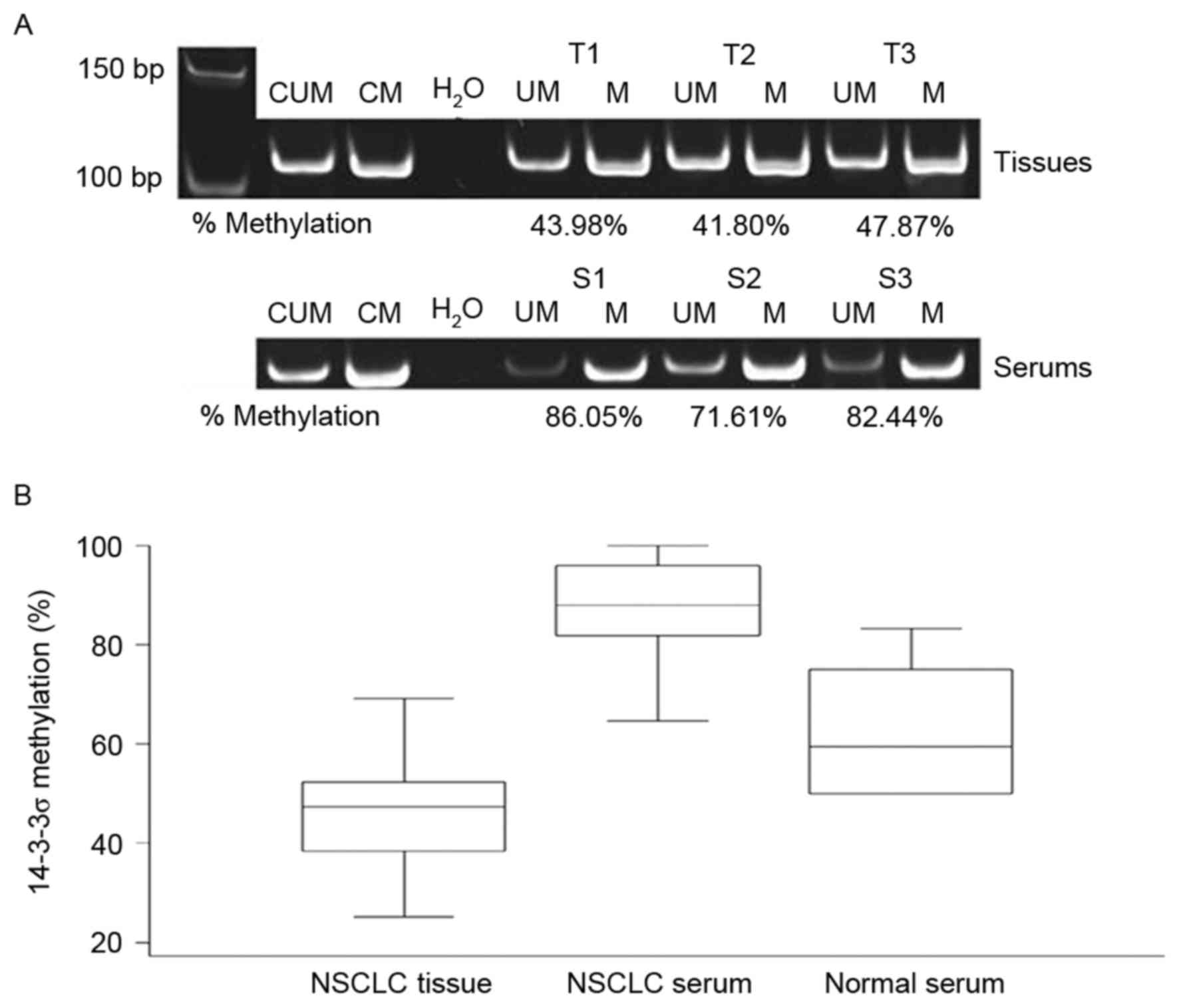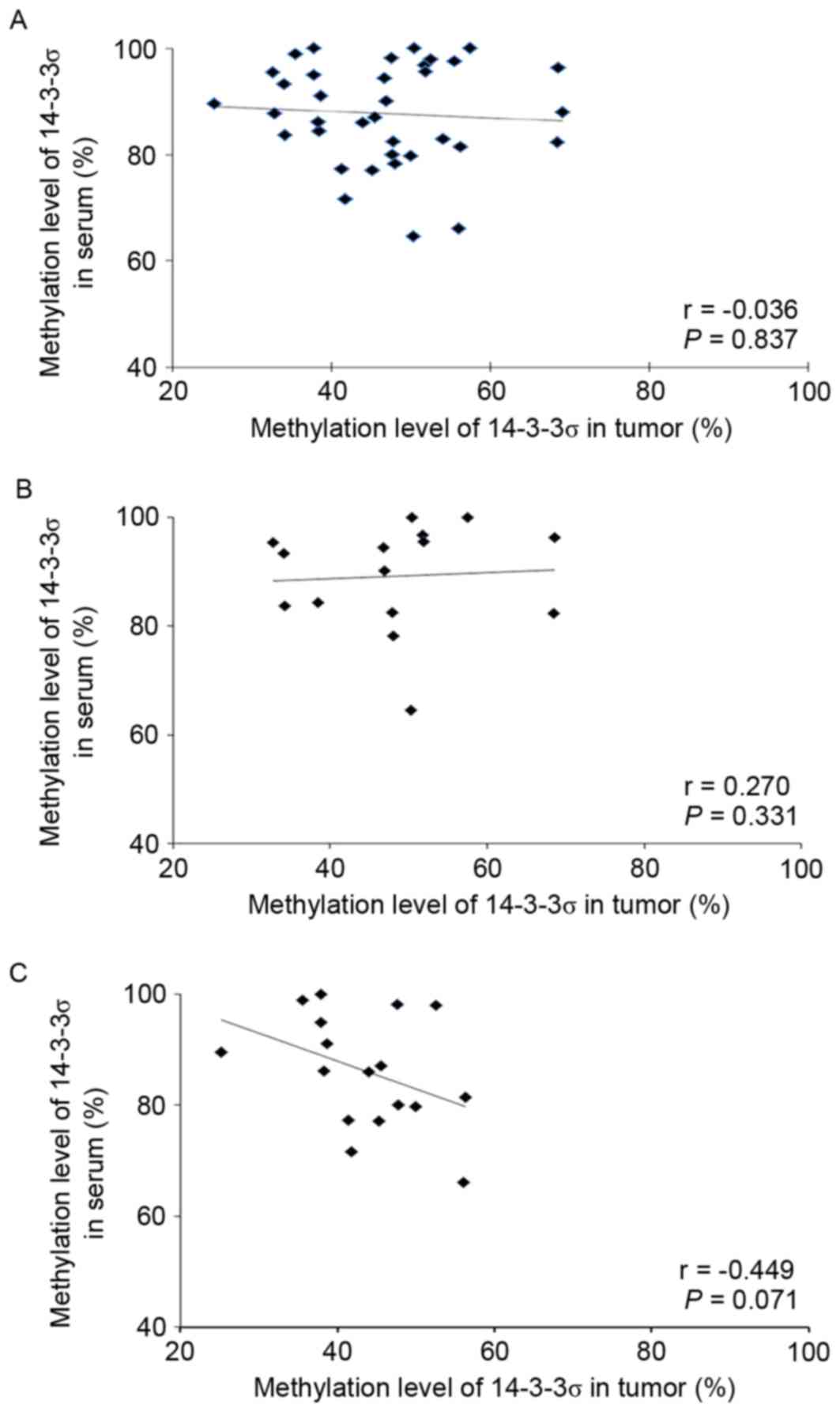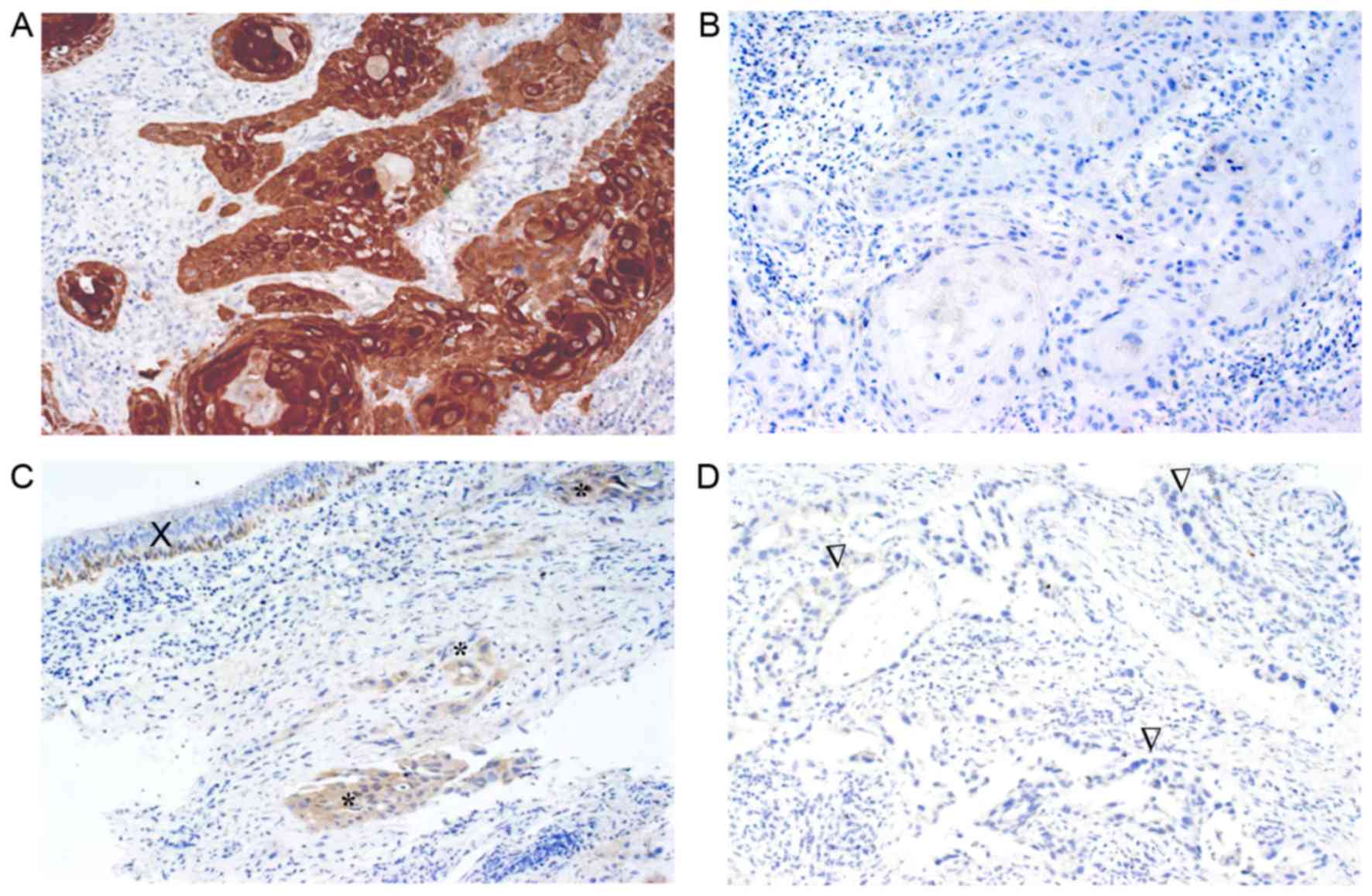|
1
|
Torre LA, Bray F, Siegel RL, Ferlay J,
Lortet-Tieulent J and Jemal A: Global cancer statistics, 2012. CA
Cancer J Clin. 65:87–108. 2015. View Article : Google Scholar : PubMed/NCBI
|
|
2
|
Attasara P and Sriplung H: Cancer
incidence in Thailand. In: Cancer in Thailand Volume VI,
2004–2006Khuhaprema T, Attasara P, Sriplung H, Wiangnon S,
Sumitsawan Y and Sangrajrang S: National Cancer Institute
(Thailand); Bangkok: pp. 3–68. 2012
|
|
3
|
National Cancer Institute: SEER Cancer
Statistics Review. 1975–2012 http://seer.cancer.gov/csr/1975_2012/Accessed.
April;2015.
|
|
4
|
Aitken A: 14-3-3 proteins: A historic
overview. Semin Cancer Biol. 16:162–172. 2006. View Article : Google Scholar : PubMed/NCBI
|
|
5
|
Galan JA, Geraghty KM, Lavoie G, Kanshin
E, Tcherkezian J, Calabrese V, Jeschke GR, Turk BE, Ballif BA,
Blenis J, et al: Phosphoproteomic analysis identifies the tumor
suppressor PDCD4 as a RSK substrate negatively regulated by 14-3-3.
Proc Natl Acad Sci USA. 111:E2918–E2927. 2014. View Article : Google Scholar : PubMed/NCBI
|
|
6
|
Dar A, Wu D, Lee N, Shibata E and Dutta A:
14-3-3 proteins play a role in the cell cycle by shielding cdt2
from ubiquitin-mediated degradation. Mol Cell Biol. 34:4049–4061.
2014. View Article : Google Scholar : PubMed/NCBI
|
|
7
|
Hermeking H, Lengauer C, Polyak K, He TC,
Zhang L, Thiagalingam S, Kinzler KW and Vogelstein B: 14-3-3 sigma
is a p53-regulated inhibitor of G2/M progression. Mol Cell. 1:3–11.
1997. View Article : Google Scholar : PubMed/NCBI
|
|
8
|
Ferguson AT, Evron E, Umbricht CB, Pandita
TK, Chan TA, Hermeking H, Marks JR, Lambers AR, Futreal PA,
Stampfer MR and Sukumar S: High frequency of hypermethylation at
the 14-3-3 sigma locus leads to gene silencing in breast cancer.
Proc Natl Acad Sci USA. 97:6049–6054. 2000. View Article : Google Scholar : PubMed/NCBI
|
|
9
|
Suzuki H, Itoh F, Toyota M, Kikuchi T,
Kakiuchi H and Imai K: Inactivation of the 14-3-3 sigma gene is
associated with 5′ CpG island hypermethylation in human cancers.
Cancer Res. 60:4353–4357. 2000.PubMed/NCBI
|
|
10
|
Lodygin D and Hermeking H: The role of
epigenetic inactivation of 14-3-3sigma in human cancer. Cell Res.
15:237–346. 2005. View Article : Google Scholar : PubMed/NCBI
|
|
11
|
Mhawech P, Greloz V, Assaly M and Herrmann
F: Immunohistochemical expression of 14-3-3 sigma protein in human
urological and gynecological tumors using a multi-tumor microarray
analysis. Pathol Int. 55:77–82. 2005. View Article : Google Scholar : PubMed/NCBI
|
|
12
|
Chen X, Ba Y, Ma L, Cai X, Yin Y, Wang K,
Guo J, Zhang Y, Chen J, Guo X, et al: Characterization of microRNAs
in serum: A novel class of biomarkers for diagnosis of cancer and
other diseases. Cell Res. 18:997–1006. 2008. View Article : Google Scholar : PubMed/NCBI
|
|
13
|
Perathoner A, Pirkebner D, Brandacher G,
Spizzo G, Stadlmann S, Obrist P, Margreiter R and Amberger A:
14-3-3sigma expression is an independent prognostic parameter for
poor survival in colorectal carcinoma patients. Clin Cancer Res.
11:3274–3279. 2005. View Article : Google Scholar : PubMed/NCBI
|
|
14
|
Laimer K, Blassnig N, Spizzo G, Kloss F,
Rasse M, Obrist P, Schäfer G, Perathoner A, Margreiter R and
Amberger A: Prognostic significance of 14-3-3sigma expression in
oral squamous cell carcinoma (OSCC). Oral Oncol. 45:127–134. 2009.
View Article : Google Scholar : PubMed/NCBI
|
|
15
|
Zhou WH, Tang F, Xu J, Wu X, Feng ZY, Li
HG, Lin DJ, Shao CK and Liu Q: Aberrant upregulation of 14-3-3o
expression serves as an inferior prognostic biomarker for gastric
cancer. BMC Cancer. 11:3972011. View Article : Google Scholar : PubMed/NCBI
|
|
16
|
Qi W, Liu X, Qiao D and Martinez JD:
Isoform-specific expression of 14-3-3 proteins in human lung cancer
tissues. Int J Cancer. 113:359–63. 2005. View Article : Google Scholar : PubMed/NCBI
|
|
17
|
Shiba-Ishii A, Kano J, Morishita Y, Sato
Y, Minami Y and Noguchi M: High expression of stratifin is a
universal abnormality during the course of malignant progression of
early-stage lung adenocarcinoma. Int J Cancer. 129:2445–2453. 2011.
View Article : Google Scholar : PubMed/NCBI
|
|
18
|
Osada H, Tatematsu Y, Yatabe Y, Nakagawa
T, Konishi H, Harano T, Tezel E, Takada M and Takahashi T: Frequent
and histological type-specific inactivation of 14-3-3sigma in human
lung cancers. Oncogene. 21:2418–2424. 2002. View Article : Google Scholar : PubMed/NCBI
|
|
19
|
International Union Against Cancer (UICC):
TNM classification of malignant tumours. Sobin LH, Gospodarowicz MK
and Wittekind CH: 7th. Wiley-Blackwell; Hoboken, NJ: 2009
|
|
20
|
Travis WD, Brambilla E, Müller-Hermelink
HK and Harris CC: World Health Organization Classification of
TumoursPathology and Genetics of Tumours of the Lung, Pleura,
Thymus and Heart. 3rd. IARC Press; Lyon: pp. 145–975. 2004
|
|
21
|
Green MR and Sambrook J: Molecular
cloningA laboratory manual. 4th. Cold Spring Harbor Laboratory
Press; Cold Spring Harbor, NY: 2012
|
|
22
|
Jones PA and Baylin SB: The fundamental
role of epigenetic events in cancer. Nat Rev Genet. 3:415–428.
2002.PubMed/NCBI
|
|
23
|
Luo J, Feng J, Lu J, Wang Y, Tang X, Xie F
and Li W: Aberrant methylation profile of 14-3-3 sigma and its
reduced transcription/expression levels in Chinese sporadic female
breast carcinogenesis. Med Oncol. 27:791–797. 2010. View Article : Google Scholar : PubMed/NCBI
|
|
24
|
Yi B, Tan SX, Tang CE, Huang WG, Cheng AL,
Li C, Zhang PF, Li MY, Li JL, Yi H, et al: Inactivation of 14-3-3
sigma by promoter methylation correlates with metastasis in
nasopharyngeal carcinoma. J Cell Biochem. 106:858–866. 2009.
View Article : Google Scholar : PubMed/NCBI
|
|
25
|
Shiba-Ishii A and Noguchi M: Aberrant
stratifin overexpression is regulated by tumor-associated CpG
demethylation in lung adenocarcinoma. Am J Pathol. 180:1653–1662.
2012. View Article : Google Scholar : PubMed/NCBI
|
|
26
|
Gormally E, Hainaut P, Caboux E, Airoldi
L, Autrup H, Malaveille C, Dunning A, Garte S, Matullo G, Overvad
K, et al: Amount of DNA in plasma and cancer risk: A prospective
study. Int J Cancer. 111:746–749. 2004. View Article : Google Scholar : PubMed/NCBI
|
|
27
|
Esteller M, Sanchez-Cespedes M, Rosell R,
Sidransky D, Baylin SB and Herman JG: Detection of aberrant
promoter hypermethylation of tumor suppressor genes in serum DNA
from non-small cell lung cancer patients. Cancer Res. 59:67–70.
1999.PubMed/NCBI
|
|
28
|
Ramirez JL, Rosell R, Taron M,
Sanchez-Ronco M, Alberola V, de Las Peñas R, Sanchez JM, Moran T,
Camps C, Massuti B, et al: 14-3-3sigma methylation in pretreatment
serum circulating DNA of cisplatin-plus-gemcitabine-treated
advanced non-small-cell lung cancer patients predicts survival: The
Spanish Lung Cancer Group. J Clin Oncol. 23:9105–9112. 2005.
View Article : Google Scholar : PubMed/NCBI
|
|
29
|
Jylhävä J, Jylhä M, Lehtimäki T, Hervonen
A and Hurme M: Circulating cell-free DNA is associated with
mortality and inflammatory markers in nonagenarians: The Vitality
90+ Study. Exp Gerontol. 47:372–378. 2012. View Article : Google Scholar : PubMed/NCBI
|
|
30
|
Umetani N, Kim J, Hiramatsu S, Reber HA,
Hines OJ, Bilchik AJ and Hoon DS: Increased integrity of free
circulating DNA in sera of patients with colorectal or
periampullary cancer: Direct quantitative PCR for ALU repeats. Clin
Chem. 52:1062–1069. 2006. View Article : Google Scholar : PubMed/NCBI
|
|
31
|
Liu Y, Chen Q and Zhang JT: Tumor
suppressor gene 14-3-3sigma is down-regulated whereas the
proto-oncogene translation elongation factor 1delta is up-regulated
in non-small cell lung cancers as identified by proteomic
profiling. J Proteome Res. 3:728–735. 2004. View Article : Google Scholar : PubMed/NCBI
|
|
32
|
Cheng L, Pan CX, Zhang JT, Zhang S, Kinch
MS, Li L, Baldridge LA, Wade C, Hu Z, Koch MO, et al: Loss of
14-3-3sigma in prostate cancer and its precursors. Clin Cancer Res.
10:3064–3068. 2004. View Article : Google Scholar : PubMed/NCBI
|
|
33
|
Ren HZ, Pan GQ, Wang JS, Wen JF, Wang KS,
Luo GQ and Shan XZ: Reduced stratifin expression can serve as an
independent prognostic factor for poor survival in patients with
esophageal squamous cell carcinoma. Dig Dis Sci. 55:2552–2560.
2010. View Article : Google Scholar : PubMed/NCBI
|
|
34
|
Akahira J, Sugihashi Y, Suzuki T, Ito K,
Niikura H, Moriya T, Nitta M, Okamura H, Inoue S, Sasano H, et al:
Decreased expression of 14-3-3 sigma is associated with advanced
disease in human epithelial ovarian cancer: Its correlation with
aberrant DNA methylation. Clin Cancer Res. 10:2687–3793. 2004.
View Article : Google Scholar : PubMed/NCBI
|
|
35
|
Li YL, Liu L, Xiao Y, Zeng T and Zeng C:
14-3-3σ is an independent prognostic biomarker for gastric cancer
and is associated with apoptosis and proliferation in gastric
cancer. Oncol Lett. 9:290–294. 2015.PubMed/NCBI
|

















